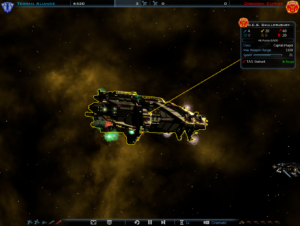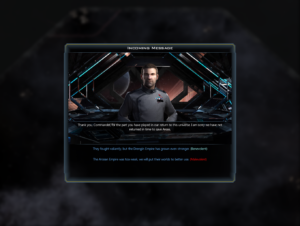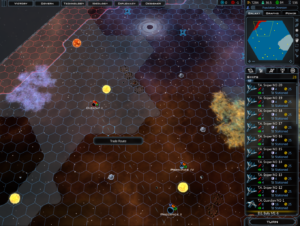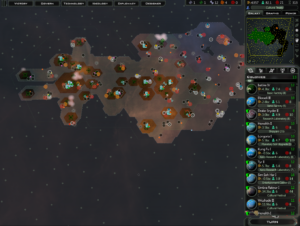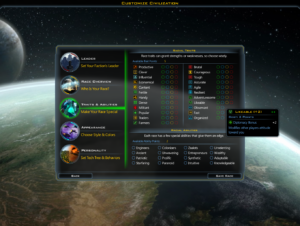Galactic Civilizations 3 is a next installment in the series of space-based 4X strategy games from Stardock Entertainment. As can be expected from the genre, the player takes control of either humans or one of the numerous alien races which fight for the control of the galaxy. The fighting can be done with spaceships armed with lasers, railguns and missiles but it’s also possible to choose a more subtle approach – diplomacy, cultural domination, technological advancement and the study of mysterious ‘ascension crystals’ left behind by the ancient Precursors can also be used to achieve victory.
Like many strategy games, Galactic Civilizations 3 isn’t very concerned about graphics, music or the storyline. That is not to say that they’re bad – they aren’t, but they don’t stand out either. It’s pretty clear that all those things are here mostly to provide a non-distracting space opera backdrop. It’s not too memorable but it’s functional – nothing you see or hear in the game would feel out of place in a science fiction film or TV show. In fact, the game’s campaign features some really well-made cutscenes which could almost be mistaken for scenes from a CGI-heavy space opera series.
From the gameplay perspective, Galactic Civilizations 3 is very similar to its predecessor. Just like in the series’ second installment, you can colonize planets, build spaceships and ‘starbases’ (specialized space stations which can be used for, among other things, defense, spreading your culture or mining resources), research technology, wage wars and conduct diplomacy. You can also design your own races and spaceships.
The game has a sandbox mode and a campaign, although the latter feels pretty restrictive for 4X standards. Each campaign mission has objectives to follow and a few text-based events at the beginning (a nice opportunity for getting more ideology points). This – along with the fact that you don’t start them from the scratch but with a certain amounts of ships, colonies and discovered techs – means that it forces you to adapt to a certain playstyle and while it sometimes gives you a choice (e.g. conquering certain races or making them into your allies), one of them is usually so much easier than the others that it wouldn’t be far-fetched to assume that there’s simply a correct way of doing things, that the player is only allowed to stray so far from the additional challenge.
Most of the changes to the game are welcome but pretty minor – the map now uses a hexadecimal grid, the semi-random events (which happen mostly during the colonization of a new planet) now give you points in three different ideologies (‘malevolent’ which focuses on warfare, ‘pragmatic’ which focuses on economy and production and ‘benevolent’ which focuses on culture and colonization) and building things on planets is now more involved as placing objects next to each other gives adjacency bonuses and so does building on certain randomized terrain features.
Really, the biggest difference between Galactic Civilizations 2 and Galactic Civilizations 3 is scale. There are more technologies to research (with mutually exclusive specializations and slightly different tech trees for each race), there are more ways to customize ships and races, the starbases are now modular which means there are also many different configurations.
Most importantly, the game can now generate really huge maps (that’s the reason the game requires a 64-bit computer) which really make you feel like exploring vast, dark reaches of space. As the other big change to the game is that it now has multiplayer, it means that Galactic Civilizations 3 might become a cult classic among those who love long and extensive matches played over many sessions and dozens of hours. Unfortunately for those players, the game does not offer simultaneous turn resolution which could turn into a great PBeM title.
With bigger worlds come a few minor issues though. The first is performance as even on a fast computer, it may take a while until the AI resolves a turn. The 1.0.1 patch has significantly improved this, although it may still be a problem, especially with larger fleets. The second is the fact that larger worlds make ideology seem relatively pointless as they allow players to easily get every bonus from every ideology in a single game. The third one is the fact that none of the ships available in the game are good at traversing large distances – they all move a few tiles per turn, taking seemingly forever to get from point A to point B in larger galaxies.
Getting into Galactic Civilizations 3 isn’t easy but this is to be expected from such a large and complex game. Unfortunately, the tutorial and manual don’t explain some features adequately. A lot of trial and error will be required to learn the fleet system (also known as ‘why did putting these ships on a single hex group them into a fleet while putting those didn’t’), diplomacy (the manual even tells you that it’s complicated and you must learn it yourself) or how does morale work exactly? And that can be a problem as you’re going to be figuring out those things instead of learning how to win the game.
While the campaign mode’s goal-oriented nature with targets to destroy and ships to protect could serve as a way to teach the newcomers about more in-depth aspects of the gameplay, it doesn’t really work this way as after 2 or 3 missions the difficulty goes up noticeably and it becomes about as hard as the sandbox mode. Unforunately, it seems that Galactic Civilizations 3 is going to have the same problem many other strategy games have: the best way to learn how to play it will probably be not from official materials but through reading user-created guides and watching other players.
Challenging, non-cheating AI which made other games in the series famous makes a return in Galactic Civilizations 3. Computer-controlled players (at least on normal difficulty and below) play the game the way a human would – they even recognize and counter some common 4X tactics. I really liked how in one game my diplomatic relations with an allied civilization suffered because I’ve tried culture-flipping one of their planets. Such a design makes for a hard but fair game in which mastering the mechanics is more important than exploiting AI quirks, and playing in single player serves as a preparation to fighting against human opponents.
For a big strategy game, Galactic Civilizations 3 is pretty stable and not very buggy. I’ve personally experienced a few crashes and some strange behavior but it isn’t a common occurrence and Stardock is fixing most of them with patches. The only bug which I’ve encountered more than once is the game hanging up on startup, although it’s less common in newer builds as they have quicker startup than 1.0.0.
Galactic Civilizations 3 is a solid turn-based strategy with a great potential. Unfortunately, right now it just doesn’t do enough to surpass its predecessors and distinguish itself from competitors. It’s a good game, sure – but it does feel like an enhanced remake of Galactic Civilizations 2 rather than a full-fledged sequel.
This can change – there are DLC packs planned, Stardock as a company supports modding and the multiplayer community can unlock the potential that is hidden in the mechanics. Right now, the game is mostly Galactic Civilizations 2 made bigger, but I have high hopes for its future: after all, the examples of Sid Meier’s Civilization 5 and all the newer Paradox Interactive games show that expansions can turn a decent strategy game into a great one.
Galactic Civilizations III was reviewed on PC using a code provided by Stardock Entertainment. You can find additional information about Niche Gamer’s review/ethics policy here.
The Verdict: 7
The Good:
- Large-scale space explorarion and warfare
- Great level of customizability
- Challenging but fair gameplay
The Bad:
- Lacking tutorial and manual
- Uninspired and restrictive campaign
- Not enough improvements when compared to the predecessors


